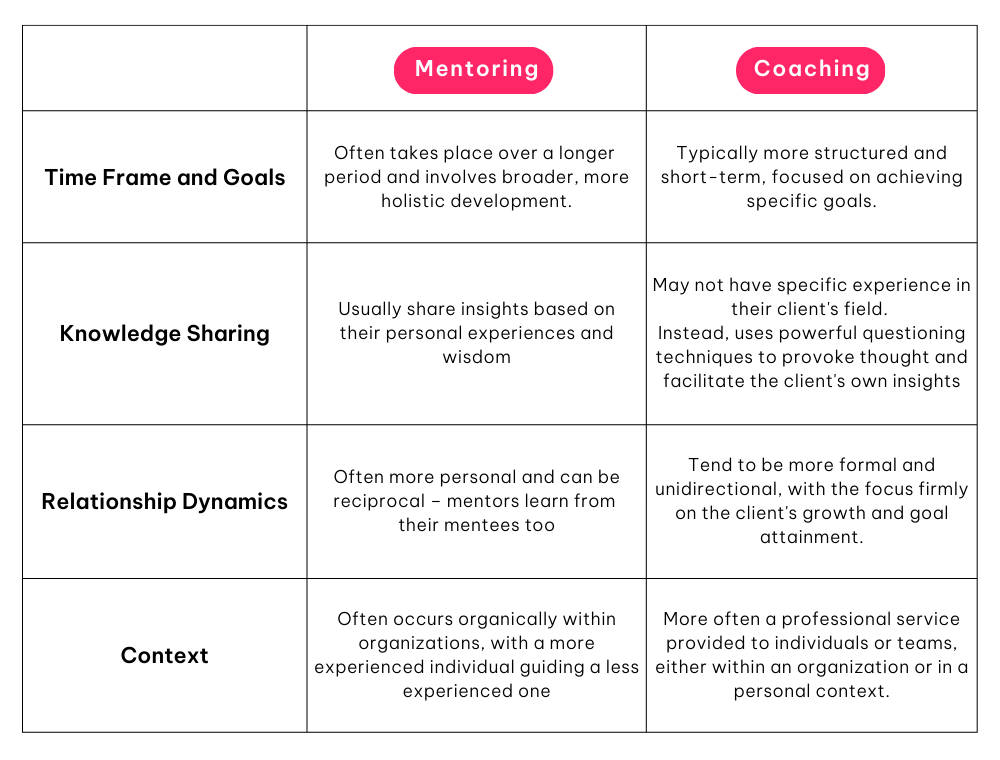Mentoring vs. Coaching: How to Maximize Your Expertise

Are you the kind of person who enjoys guiding others, sharing wisdom from your own life experiences?
Or maybe you're the type to ask those challenging questions that help people unlock their own potential.
Whichever you are, you're clearly passionate about making a difference, but you might be wondering: should you become a mentor or a coach?
We're here to help you navigate these two exciting roles in personal and professional development. We'll explain the differences, dig into the benefits and challenges of each, and give you some tips to figure out which one aligns with your skills and aspirations.
By the end of this article, you'll have a clear picture of what both paths look like and be well on your way to choosing your ideal role. So, are you ready to find out where your journey begins?
Here’s what we’ll cover in this article:
Becoming a Mentor: Definition, Roles, and Key Features
Dive into the world of mentoring, understand what it means, and discover what makes a great mentor.Becoming a Coach: Definition, Roles, and Key Features
Ready to switch gears? Let's check out the ins and outs of coaching and what it takes to be a rockstar coach.Comparing the Mentor and Coach Pathways
It's time for a face-off! We'll highlight the similarities and differences between mentoring and coaching.Assessing Your Strengths and Experience: Choosing Your Path
Time for some introspection. Let's figure out which path - mentoring or coaching - aligns with your strengths and experience.Establishing Effective Mentoring or Coaching Relationships
Relationships are at the heart of mentoring and coaching. Let's look at how to build solid, effective relationships with mentees and clients.5 Potential Challenges in Developing Your Mentoring or Coaching Practice
Life is full of challenges, and so is mentoring and coaching. Let's look at possible bumps along the road and how to overcome them.The Impact of Effective Mentoring and Coaching: The Power to Transform Lives
Becoming a Mentor: Definition, Roles, and Key Features
What exactly is mentoring?
Think of mentoring as a journey you embark on with someone who's eager to learn, grow, and develop.
It's a relationship between two people: you, the mentor, sharing your wisdom, experiences, and expertise; and your mentee, soaking up your insights like a sponge and applying them to their own life or career.
And what does a mentor do?
As a mentor, you're not just a teacher or advisor. You're a trusted guide and role model.
You listen and provide feedback, you share your knowledge and personal experiences, and most importantly, you inspire your mentee to reach their full potential. Your role goes beyond giving advice on specific skills or tasks—it's about fostering personal and professional growth in your mentee over time.
Your responsibilities may include offering advice on career paths, helping your mentee build their network, setting and achieving goals, and even guiding them through tough decisions.
Remember, as a mentor, you're not there to provide all the answers. Instead, you're helping your mentee find their own solutions and make informed decisions.
What makes a successful mentoring relationship?
A great mentoring relationship is built on a foundation of trust and respect. This doesn't happen overnight—it's a process. Here are a few key elements:
Clear Communication: Setting expectations, goals, and boundaries from the beginning is crucial. Don't be afraid to discuss how often you'll meet, how you'll communicate between meetings, and what topics are off the table.
Mutual Respect: Value each other's time and input. Recognize that the relationship is a two-way street—mentors can learn just as much from their mentees as vice versa!
Active Listening: Paying close attention to what your mentee is saying (and not saying!) shows that you care about their perspective and helps you provide valuable insights.
Shared Values: Successful mentoring often happens when both parties have a shared sense of purpose and values. It's not about agreeing on everything, but having a common ground helps keep the relationship positive and productive.
Commitment: Both mentor and mentee need to be committed to the process. Growth and development take time, so be patient and persistent.
It's also important to find a communication style that works for both the mentor and mentee. Asynchronous communication can be a great way to stay connected and allow for flexibility in the mentoring process.
It allows the mentee to ask questions or seek guidance at their own pace, while the mentor can respond when they have time to provide thoughtful feedback. Async communication can also help bridge any scheduling or time zone barriers that may exist between the mentor and mentee.
Whether you've just realized that mentoring might be your calling or you're already guiding a few eager minds, understanding these key elements will help you strengthen your practice and enrich your mentoring journey.
Becoming a Coach: Definition, Roles, and Key Features
What's the scoop on coaching?
If mentoring is like a journey, then think of coaching as a training session. Coaching is a dynamic, goal-oriented process where you, as the coach, help people unlock their potential and improve their performance.
It's less about imparting your personal wisdom, and more about providing the tools and techniques that enable people to find their own answers and grow.
What's in a coach's job description?
As a coach, your role is to encourage, challenge, and support your clients as they work towards specific personal or professional goals.
Whether it's helping a business executive enhance their leadership skills, supporting a client in achieving a healthier lifestyle or assisting someone to transition into a new career, your focus is on fostering growth and change in a more structured and short-term manner than mentoring.
Coaching responsibilities can vary depending on the context, but they generally include setting clear goals, asking powerful questions to challenge your client's thinking, offering feedback, and tracking progress.
What creates a successful coaching relationship?
A successful coaching relationship, like mentoring, relies on trust and respect. However, its nature calls for a few additional elements:
Goal-Oriented Approach: The coaching relationship should have a clear focus. You and your client will define specific, measurable goals, and you'll facilitate the client's journey to achieve them. Check out our guide on creating a coaching program here!
Powerful Questioning: Great coaches have a knack for asking thought-provoking questions. These questions help clients dig deeper into their experiences and perspectives, leading to valuable insights and breakthroughs.
Accountability: A key part of your role as a coach is holding your clients accountable for their actions. This helps maintain progress and keeps your clients focused on their goals.
Confidentiality: As a coach, you'll often be privy to personal and sensitive information. Maintaining confidentiality is crucial to building trust with your clients.
Flexibility: Every client is unique, and what works for one might not work for another. Being flexible and adaptive to each client's needs is a hallmark of a good coach.
Similar to mentoring, coaches can also benefit from using an async approach in their programs! An asynchronous approach to coaching can be an effective way to help clients reflect on their progress and identify areas for improvement.
By providing clients with time to think through their goals and progress, coaches can help them gain a deeper understanding of their own strengths and weaknesses and develop more effective strategies for achieving their goals.
So, are you the motivational catalyst who thrives on helping others achieve their goals? If coaching sounds like it might be up your alley, you're in the right place. Next, we'll delve deeper into the similarities and differences between mentoring and coaching!
Comparing the Mentor and Coach Pathways
Mentoring vs. Coaching: How are they similar?
At the heart of both mentoring and coaching, there's a common thread: empowering others. Whether you're a mentor sharing your wisdom or a coach catalyzing change, you're in the business of helping people grow and reach their potential.
Both mentors and coaches listen actively, provide feedback, and foster an environment of trust and respect. They both require excellent communication skills, patience, empathy, and a genuine desire to see others succeed.
In essence, whether you're mentoring or coaching, you're playing a transformative role in someone's personal or professional life. You're there to guide, challenge, and support, all while fostering a relationship built on trust.
Mentoring vs. Coaching: What sets them apart?
While both mentoring and coaching share a common goal, the way they go about achieving it can be quite different.

In our exploration of "Mentoring vs. Coaching," it's clear that while they share common ground, each has its unique strengths and approaches.
Whether you gravitate towards the shared wisdom of mentoring or the goal-focused structure of coaching, both paths offer rewarding opportunities to make a lasting impact on others.
Assessing Your Strengths and Experience: Mentoring vs. Coaching
Taking a good, hard look at your skills
When deciding between mentoring and coaching, the first step is to evaluate your own strengths, experiences, and passions.
Do you have a wealth of experience in a specific field and love sharing your wisdom? Then mentoring could be right up your alley.
Or maybe you're adept at asking probing questions, setting goals, and motivating people to take action. In that case, coaching could be your calling.
Let's look at some real-life examples:
Consider Sheryl Sandberg, the COO of Facebook and author of the influential book "Lean In".
Sandberg has a reputation for nurturing young talent within the tech industry, sharing her insights and experiences, and supporting women in their leadership journey. Her passion for helping others grow and her wealth of professional wisdom make her a highly respected mentor.
On the other hand, there's Tony Robbins, a renowned life and business coach.
Robbins may not have specific expertise in each client's field, but his dynamic approach to prompting individuals to explore their motivations, set ambitious goals, and take bold steps toward achieving them, demonstrate his exceptional skills as a coach.
Learning from the experts
Let's hear directly from some established mentors and coaches about their experiences.
Renowned business mentor Linda Hill, professor at Harvard Business School, once said:
"The best mentors avoid overriding the independence and self-determination of their protégés."
This quote illustrates the essence of mentoring, emphasizing the mentor's role in fostering autonomy and encouraging mentees to find their own path.
In contrast, International Coach Federation Master Certified Coach, Marcia Reynolds, emphasizes the transformative power of coaching:
"In a coaching conversation, the coach listens to the emotions, patterns, and underlying beliefs to reflect back an expanded picture of possibility that increases the potential for change."
This highlights the coach's role in empowering clients to explore their thoughts and feelings and envision new possibilities.
These insights from experts in the field of mentoring and coaching illustrate how each role leverages different strengths and approaches for facilitating growth and development.
Remember that your choice depends on your personal strengths, experiences, and how you wish to impact others.
Establishing Effective Mentoring or Coaching Relationships
The magic starts with clear expectations and goals
Whether you're walking the path of mentoring or coaching, clarity is king.
In mentoring, it’s important to understand your mentee’s aspirations. What do they hope to gain from your relationship? Do they want career advice, skill development, or broader life wisdom? A clear understanding of this will help you provide the right guidance.
As a coach, goal-setting is at the heart of your relationship with clients. What specific targets do they want to reach? These could be related to their personal life, career, or a specific skill they want to develop. Defining these goals at the outset gives you a roadmap to guide your coaching sessions.
Keep the lines of communication open
Open communication is the glue that holds both mentoring and coaching relationships together. You need to be open, honest, and respectful. But how can you do this?
Here are a couple of strategies:
Regular Check-ins: Regularly ask your mentee or client how they're feeling about the process. This could be at the end of a session or through occasional feedback forms.
Consider an Open-door Policy: Let them know they can approach you with any concerns or questions outside of your regular meetings. This encourages ongoing dialogue and builds a stronger relationship.
Building trust and mutual respect
Trust and respect are fundamental in both mentoring and coaching. But these qualities don’t magically appear - they must be consciously cultivated.
Here are some practical tips:
Be Genuine: Authenticity fosters trust. Be open about your experiences and don't be afraid to show vulnerability. This helps your mentee or client feel comfortable opening up to you.
Maintain Confidentiality: Keep discussions private. This is especially important when handling sensitive information.
Respect Their Perspective: Everyone has a unique perspective. Respect your mentee’s or client’s views, even if they differ from yours.
There you have it - a blueprint for forging successful mentorship or coaching relationships. Now, armed with these insights, you're ready to make a difference.
If you need more tips on client communication, we've got you covered! Check out this article on client communication best practices.
5 Potential Challenges in Developing Your Mentoring or Coaching Practice
Embarking on a journey as a mentor or a coach is rewarding, but it isn't without its challenges. Here are some potential hurdles you might encounter and tips on how to navigate them:
Challenge 1: Building Credibility
Whether you're a mentor or a coach, you need to establish credibility. This could be more challenging for new mentors and coaches who are just starting out.
Overcoming it: Show your competence through your actions. Continuously learn and improve your knowledge and skills. Consider obtaining relevant certifications. Share your experiences, insights, and success stories when appropriate.
Challenge 2: Creating a Connection
Connecting with your mentee or client on a personal level can be challenging, but it's crucial to the success of your relationship.
Overcoming it: Be open, honest, and authentic. Show empathy and understand their perspective. Building a connection takes time, so be patient and persistent.
Challenge 3: Encouraging Engagement
You may face situations where your mentee or client seems disinterested or not fully committed.
Overcoming it: Foster a collaborative relationship. Involve them in setting goals and devising action plans. Regularly provide feedback and acknowledge their progress.
Challenge 4: Dealing with Difficult Conversations
Whether it's addressing performance issues or discussing sensitive topics, difficult conversations are part of mentoring and coaching.
Overcoming it: Be clear, compassionate, and constructive in your communication. Provide feedback that's focused on actions, not the person. Listen to their views and make them feel heard.
Challenge 5: Maintaining Boundaries
As a mentor or coach, you might encounter situations where it's challenging to maintain professional boundaries.
Overcoming it: Be clear about your role and the scope of your relationship from the beginning. If a situation arises that's outside of your expertise, be willing to refer them to other professionals.
Remember, every challenge is an opportunity for growth. Keep these potential hurdles in mind as you continue on your path as a mentor or a coach, and don't forget that the rewards you'll reap in this journey will often outweigh the obstacles. Onwards and upwards!
The Impact of Effective Mentoring and Coaching: The Power to Transform Lives
Being a mentor or a coach is more than a profession. It's a calling, an opportunity to shape lives and inspire change.
Through effective mentoring or coaching, you have the power to unlock potential, catalyze growth, and contribute to the personal and professional development of others.
Every conversation you facilitate, every insight you share, every goal you help to achieve, brings about change. You're not just guiding individuals or teams toward their goals - you're helping them grow, evolve, and become the best versions of themselves.
The power of mentoring and coaching is undeniable. It's a journey of transformation, not just for your mentees or clients, but for you as well. As you guide others in their journey, you too grow, learn, and evolve.
Remember, this journey might be filled with challenges, but with each hurdle you overcome, you become a better mentor or a coach. And for each life you touch, the world becomes a little better, one transformation at a time.
So are you ready to maximize your impact and transform lives? With Clarityflow, running your online mentoring or coaching business has never been easier. Experience seamless management of your practice with Clarityflow today.


